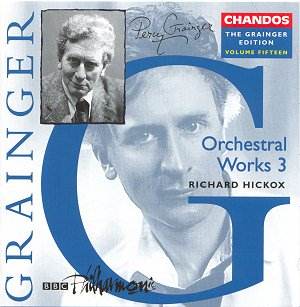Percy GRAINGER (1882-1961)
The Chandos Grainger Edition Volume 15
Orchestral Works 3
 Richard Hickox conducts the
BBC Philharmonic
Richard Hickox conducts the
BBC Philharmonic
 CHANDOS CHAN 9839
[70:25]
CHANDOS CHAN 9839
[70:25]
Crotchet
Amazon
UK
Amazon
USA

You have to admire Percy Grainger's perspicacity. To help ensure performances
of his works, he created multiple arrangements of them for all sorts of different
instrumental and vocal combinations. He even created combinations of
combinations.
This programme kicks off with Grainger's bracing Passacaglia on an English
folk-tune - Green Bushes in its premier recording in this 1913
version that would have the academics throwing their arms up in dismay at
its seemingly undisciplined, exuberant - even wild - progress. Hill
Song No. 2 , equally invigoratingly and out-of-doors-ish, is presented
here in its 1948 apparel for performance by symphony orchestra but without
violins, trombones and tubas.
The seldom heard The Merry King, based on a folksong from West
Sussex, belies its title and is a rather solemn little piece before it works
up to an impassioned climax. Eastern Intermezzo is very colourful
and great fun. It is recorded here in its 1933 version and, according to
Barry Ould, Grainger pointed out that some of the musical procedures followed
in this composition were drastic innovations at the time of its inception
(1899) and that some of these to the best of his knowledge were then unknown
in music at that time. One notices similarities in Grainger's friend Cyril
Scott's music.
Colonial Song in its 1913 incarnation is very lovely and affecting
- big-boned and very much heart-on-sleeve. Its lack of acceptance in England
led Percy to feel 'not at home' here. The Americans loved it! Grainger wrote:
"It is quite typical that America should welcome an avowedly Colonial and
Australian piece and feel romantically about it as an expression of British
Empire feeling, while England remains indifferent to it."
Of the well-known and vivacious Spoon River, Grainger wrote:
"…is very archaic in character; typically American, yet akin to certain
Scottish and English dance tune types…My setting [begun March
10th 1919 and ended February 1 1929] aims at preserving a pioneer
blend of lonesome wistfulness and sturdy persistence."
Lord Maxwell's Goodnight in this version has the vocal line
given to the woodwinds and brass; and, although they play in unison, Grainger
makes clever use of them for each strophe.
The major item in the programme, and another less familiar work, is The
Power of Rome and the Christian Heart. It is presented in its version
for full symphony orchestra. Grainger hated the concept of the Roman Empire
he felt that its 'poison' - "a privileged few catered to by a host of slaves"
- had crept up through Europe to corrupt its peoples. Beginning with eerie
remote organ chords, it contrasts, with huge orchestral climaxes, the brutal
might of Rome with more sympathetic material suggesting the plight of the
oppressed. At one point, there are Morse code like figures suggesting the
spread of Rome's message. An extraordinary work that also has a more than
passing reference to Rachmaninov.
The Immovable Do (or 'The Cyphering C') is a high drone on
C which is sounded throughout the entire piece. This 1940 version for full
orchestra has rich flowing melodic material and it rises to several dramatic
climaxes. Grainger's 1920 vision of the Irish Tune from
County Derry (County Derry Air) has unusual harmonic progressions
making it sound unusually anguished and strained as well as proud and noble.
Ye banks and Braes O' Bonnie Doon is the affecting
full orchestral version of 1936. Finally, there is the delightful high-spirited
English Dance No. 1 performed in its second scoring from April
1906 to April 1909.
Richard Hickox and the BBC Philharmonic deliver sparkling and committed
performances of all these tuneful delights.
Ian Lace

